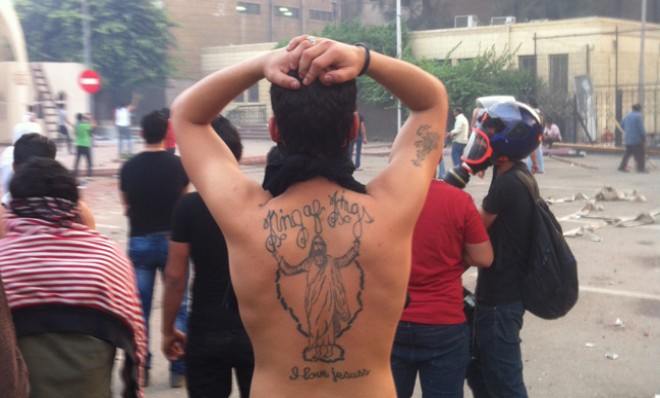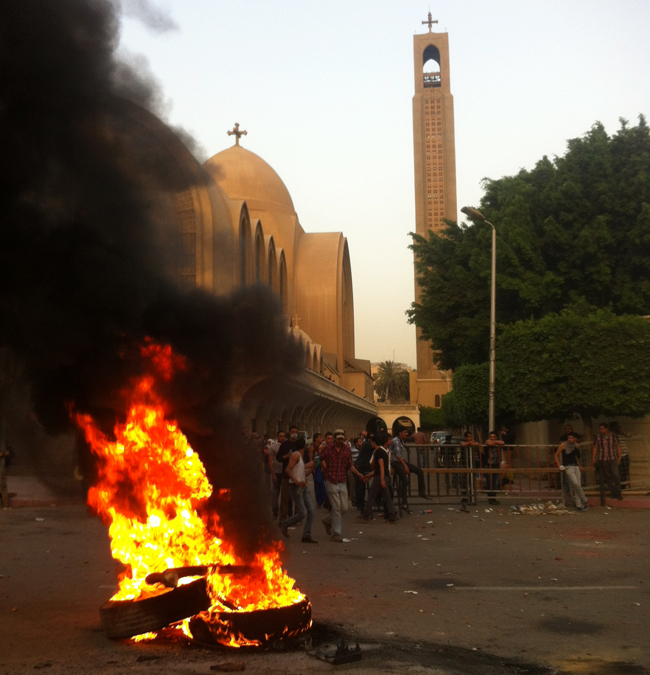Dispatch from Cairo: The frighteningly uncertain future of Christians in Egypt
Christians and Muslims generally live side by side peacefully. But there has been a troubling rise in religious violence.

A free daily email with the biggest news stories of the day – and the best features from TheWeek.com
You are now subscribed
Your newsletter sign-up was successful
Coptic Easter has come and gone. For arcane reasons, Copts, the Christian sect indigenous to Egypt, celebrate the holiday on a different date than western Christians, and last Sunday they did so in the typical Egyptian fashion. Coptic youth set off fusillades of fireworks around churches and Coptic and Muslim families shopped and ate late into the night.
Despite the revelry, this is a particularly uncertain time for Copts and other religious minorities living in Egypt.
The country has recently seen numerous deadly sectarian clashes between Copts and Muslims, including a particularly galling incident in April in which police and Muslim youth attempted to storm the main Coptic Cathedral in Cairo with guns and tear gas, eventually killing at least two Copts.
The Week
Escape your echo chamber. Get the facts behind the news, plus analysis from multiple perspectives.

Sign up for The Week's Free Newsletters
From our morning news briefing to a weekly Good News Newsletter, get the best of The Week delivered directly to your inbox.
From our morning news briefing to a weekly Good News Newsletter, get the best of The Week delivered directly to your inbox.
Amidst this growing violence, the powerful Muslim Brotherhood, which unofficially controls the ruling Freedom and Justice Party, issued a religious edict banning Muslims from wishing their Egyptian neighbors a happy Easter.
The Brotherhood leader who issued this edict, Fatwa Abdel Rahman al-Barr, said that saying happy Easter "comes at the expense" of Islam and instead suggested offering generic greetings equivalent to saying "have a good year."
This opinion — that the polite, casual acknowledgment of other faiths makes someone a bad Muslim — was repudiated by some Muslim clerics, but echoed by many more, including some who represent other powerful political parties.
Still, average Muslims in Egypt tend to be pretty tolerant toward Christians on a personal basis. While mixed marriages are taboo, interfaith friendships are common and Christians proudly display religious symbols on their bodies and in their places of business.
A free daily email with the biggest news stories of the day – and the best features from TheWeek.com
In my neighborhood, a church sits almost next to a mosque, and in a Christian-owned coffee shop, heavily bearded Salafi guys happily sip coffee and chat amongst posters of Jesus and the Virgin Mary, seemingly unconcerned that doing so will displease Allah.
From time to time, I get urged to convert to Islam (I am a non-practicing Christian) by taxi drivers and market vendors, but they always take the tone of friendly concern, urging me to accept the teachings of the Prophet Muhammad the way I would urge an alcoholic friend to quit drinking.
Christians and Muslims generally live side by side peacefully. And many blame the recent sectarian violence on the ascendant Islamists. And yet, there has been a long history of official state oppression of Christians in Egypt.
When the military dictatorship was Arab-Socialist in the mid-20th century, Copts were suspect because they had prospered under the deposed monarchy and because they were seen as insufficiently Arab. In the '70s, as Egypt's politics became more religious and the economy became increasingly dire, relations between religions became even worse.
By the '90s mob attacks on Coptic places of worship and individuals became increasingly common. Oftentimes police did not seriously investigate anti-Coptic crimes, creating a culture of impunity. By the time the revolution started, it seemed that if a Muslim attacked a Copt, there would be no repercussions.
Inter-communal violence has only grown since the revolution, and the security forces, generally seen here as a force for secularism and moderation, have increasingly taken the lead in murdering Copts. In October 2011, when the military was still officially running Egypt, army personnel supported by plain clothes thugs killed 28 Christians during a protest.
Things once again took an ugly turn on April 7, when thousands of Copts went to the largest Coptic Cathedral in Cairo to mourn 5 young Christians murdered in sectarian clashes in the previous week. As the mourners were leaving the Church they were attacked by a mob of Muslim youths with shotguns, rocks, and knives.

By the time I got to the church to cover the situation, the police had arrived and were fully supporting the Muslim mob. Young masked thugs with short-barreled shotguns were standing side by side with uniformed police who were inundating the walled cathedral compound with tear gas and birdshot as masked Copts on the walls responded with firebombs and birdshot of their own.
When I tried to ask what was going on in my accented Arabic, I was surrounded by a bunch of young plainclothes men who asked me what my nationality and religion was and demanded to see some papers. I told them I was Turkish, and eventually was able to slip away in the confusion.
While Copts here generally fear the ruling Islamists and blame them for their problems, the mob did not appear to be Islamist sympathizers. With their youth, gelled hair, and tight jeans, they had the appearance of common, apolitical Egyptian street thugs. Furthermore, the police are notoriously hostile to the Islamists and were probably acting without orders from the government.
It takes very little to provoke the Egyptian police to violence, and Muslim friends of mine said that the Muslim neighborhood near the church is controlled by a gun-selling, drug-dealing street gang that is notoriously violent. Simple bigotry and a propensity for violence, rather than deep political motives, likely united the police and thugs that day.
The ruling Islamists certainly have no love for religious minorities. However, even if they want to significantly persecute Christians, they seem to lack the ability to do so.
This may come as cold comfort to religious minorities here, who are increasingly in the crosshairs.
After slipping away from the main group of assailants, I made my way through the side streets to the back door of the fortress-like Cathedral compound. The armed Christians at the door let me into a scene of complete chaos. The compound was full of old men, women, priests, and nuns who had come to the funeral and were now trapped inside as dozens of tear gas canisters rained in.
Young men, many of whom had taken off their shirts to reveal large Christian tattoos, were running around with rocks, bombs, and shotguns, engaging assailants who were attacking from the main gate and shooting at us from the roofs of neighboring high-rise apartments.
All around there were men and women of all ages visibly suffering from tear gas and birdshot injuries. I was genuinely concerned that if the police and rioters made it through the front gate there would be a massacre. (They didn't make it through, and miraculously only two people died)
As I was about to leave, there was a large commotion by the main gate. A young Copt defending the wall had been shot in the face and fallen several feet onto his head. Blood covered his face and neck and he appeared to be dead. As a crowd dragged him back away from the fighting, one of his friends shook his arm looking for signs of life. Seeing none, his friend looked towards the sky and began to wail.
Jake Lippincott earned a degree in Middle Eastern Studies at Hampshire College. He worked in Tunis during the popular uprising there, and is now based in Cairo.
-
 6 of the world’s most accessible destinations
6 of the world’s most accessible destinationsThe Week Recommends Experience all of Berlin, Singapore and Sydney
-
 How the FCC’s ‘equal time’ rule works
How the FCC’s ‘equal time’ rule worksIn the Spotlight The law is at the heart of the Colbert-CBS conflict
-
 What is the endgame in the DHS shutdown?
What is the endgame in the DHS shutdown?Today’s Big Question Democrats want to rein in ICE’s immigration crackdown